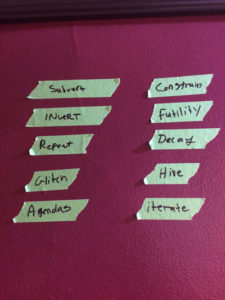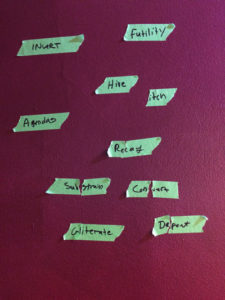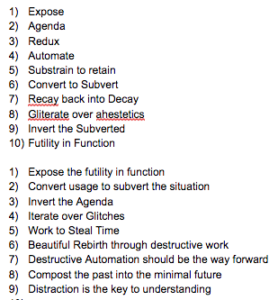This assignment was to figure out our position. I interpreted that more as making a kind of a set of statements, or specific rules you have about making things in general. Because I have a design and development background, those things sometimes fall into more efficiency or naming conventions.
For example there is an ENTIRE set of style rules for coding in Python . But you could also follow your own conventions, as long as they remain consistent. Programmers usually do a lot of refractoring as well, a sort of distilling code over iterations to try and make it more efficient or readable.
But anyways. I took it as rules. Personal rules. Underlying rules. I have a few rules of thumb I follow in life like: “Work is an iterative process” and “Execution Counts”. But I wanted to see what other things I could think of. So first I started w/ words and tape, and chopping up those words to make new words.


Then I moved to lists of words or possible statements that I felt held some importance to me:


Then I reduced those statements into basic-ish structures:

Finally I decided to automate my process via a python script to mix those words around into various proto sentences. Because maybe a randomized algorithm could do things I could not.
https://github.com/sharkwheels/IMAD_RI/blob/master/combine.py
Though it was somewhat silly, it did manage to churn out some things that I resonated with quite a bit.
- Ridiculous futures should be the way forward
- Destructive composition through amusing subversion
- Ridiculous automation through absurd iteration
- Delicate remixes through robust exposition
- Subvert your devices
- Remix the glitches
- Expose the agenda
- Compose the future into futile devices
My position is one of futile devices and ridiculous futures. We should play with the systems we exist in, break them, and expose their futility. Not only will this enable us to learn more about what supports or control us, but also how we can subvert that into new modes. There is a beauty in the world’s collection of smart, glitchy devices. Make them your own. Be your process.





